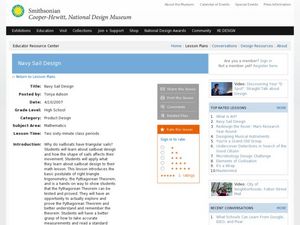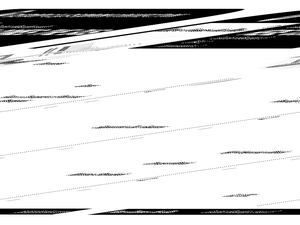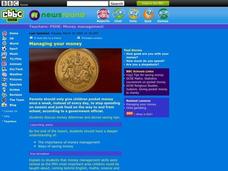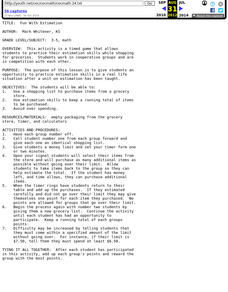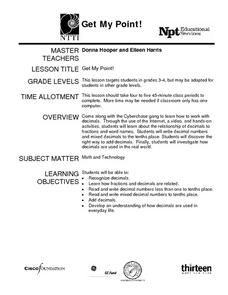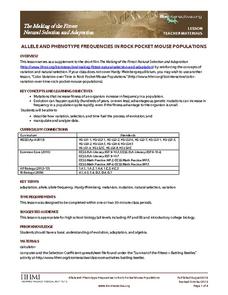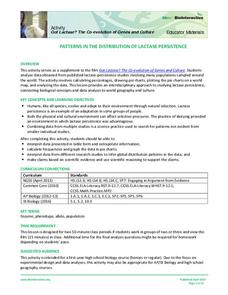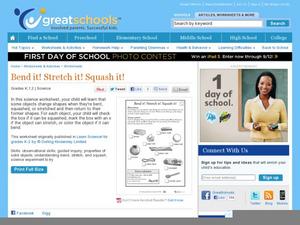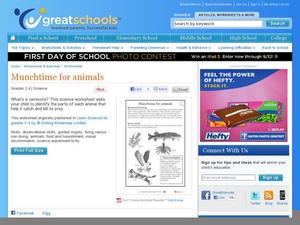Curated OER
Patterns
Fifth graders recognize shape and number patterns. In groups, 5th graders use strategies to find patterns. They extend the patterns and give explanations as to how they found the pattern. Students use the computer and the hundreds...
Curated OER
It Counts
Students explore how numbers can identify objects. In this math lesson plan, students determine how numbers are used to describe objects used in quantitative data collection.
Curated OER
Navy Sail Design
Students use the Pythagorean Theorem to explore sailboat design. In this Pythagorean Theorem lesson, two sides of a triangular sail are measured, and the theorem is used to calculate the third side. A worksheet, bulletin board design,...
Curated OER
It Counts
Students explore one to one number correspondence. In this early math lesson, students make observations about and classify plants in order to gain an understanding of using numbers to describe their world.
Curated OER
Popcorn
Learners discuss the properties of popcorn. They explore the connection between corn, popcorn and Thanksgiving. As a class, students sing a popcorn song and create a popcorn craft. They practice writing the word popcorn. As a...
Curated OER
Guided Reading Lesson: Here Comes the Bus
Learners discover basic concepts of print. In this early literacy lesson, students discover basic high frequency words. Learners make predictions as they read. Cross-curricular activities provided.
Curated OER
Bell Curve
Students explore averages by completing a data analysis activity. In this bell curve lesson, students measure different food items and plot their measurements on a X and Y axis. Students create bell curves around the average weight or...
Curated OER
Managing Your Money
Students discuss different money management options in a variety of situations. They identify moments to share, spend and save money.
Curated OER
Fun With Estimation
Students get an opportunity to practice estimation skills in a real life situation after a unit on estimation has been taught.
Curated OER
TE Activity: Tears in Rain
Students examine photographs before writing captions for them. They develop visual literacy as they see how photographs are manipulated to show the effects of acid rain. They rewrite the photo captions after a class discussion.
PricewaterhouseCoopers
Buying a Home: Income vs. Monthly Payments
Purchasing a house takes more plan than elementary schoolers realize. Each buyer will look at monthly income to determine what they can afford for a mortgage and other expenses.
PricewaterhouseCoopers
Risk Management and Insurance: Insurance Costs and Considerations
Compare the different types of insurance with high schoolers, and have them learn the benefits and costs of medical, auto, and home policies. The resource addresses what makes some insurances more costly and what teenagers can do to...
PricewaterhouseCoopers
Credit and Debt: Decisions, Decisions...
Borrowing money seems like a great idea until you are in over your head. High schoolers learn the benefits and risks associated with credit and how to be a responsible borrower. More than just credit cards, they...
PBS
Stories of Painkiller Addiction: Myth or Fact
Are opioids the most abused drug after marijuana? How hard is it for young people to obtain painkillers without a prescription? Middle and high schoolers explore the growing epidemic of opioid addiction with a instructional activity that...
SaveandInvest.org
Introduction to Earning Interest: Middle School
Does your bank pay you for allowing them to hold your money? Class members research three different ways they can earn money using money already in the bank. Topics include certificates of deposit, statement savings accounts, and...
Curated OER
Get My Point!
Here is one of the better lessons I've come across on how to teach fractions and decimals. This lesson does a great job of showing how these two mathematical representations of numbers are interrelated. Some excellent websites, printable...
Curated OER
New York City Delights: The Taxi Cab
You set the rate! Step into the shoes of a taxi driver in New York City, and also pretend to be a person who uses taxis to get around town. The class will conduct collaborative research to learn about the history of taxis. Then, they...
Curated OER
Allele and Phenotype Frequencies in Rock Pocket Mouse Populations
In the deserts of Arizona and New Mexico, some tiny creatures show just how quickly natural selection can turn a mutation into an advantageous adaptation. Watch a video about rock pocket mice, who show that one small change can make all...
Curated OER
Question words, question marks
Practice the five W's and question marks with a fun grammar learning exercise. After copying the words who, what, where, when, why, and how, kindergartners fill the words into various questions. For extra practice, have kids come up with...
Howard Hughes Medical Institute
Patterns in the Distribution of Lactase Persistence
We all drink milk as babies, so why can't we all drink it as adults? Examine the trend in lactase production on the world-wide scale as science scholars analyze and interpret data. Groups create pie charts from the data, place them on a...
Curated OER
Bend It! Stretch It! Squash It!
Some items keep their shape no matter what happens! Have your kindergarten class choose which items would stay the same if they were bent, stretched, or squashed. The last activity prompts kids to see what happens when they stretch a...
Curated OER
Getting nosy
A nose knows! Connect animals to their noses with a fun science activity. Animals include elephants, rats, pigs, and even humans. For a science exploration, kindergartners answer questions about what they can smell. A great addition to...
Curated OER
Munchtime for animals
Which animals eat meat to stay alive? Third graders group fish, hawks, and cats into carnivores and herbivores. An extended activity prompts kids to cut out magazine pictures of different animals according to the foods that they eat.
Curated OER
How Light Can "Bend"
Examine the properties of light with a fifth grade science experiment. Pupils find out how light bounces off the surface of a mirror, as well as how a periscope works. For the science investigation part, kids build their own periscope...


